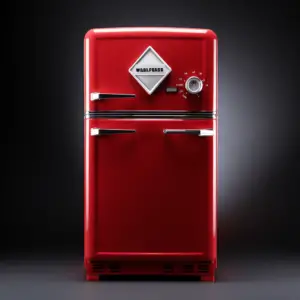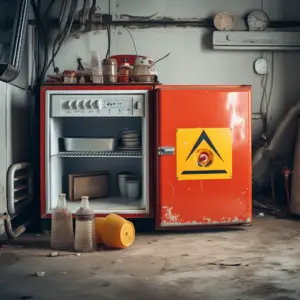Refrigerator Compressor, Without cold storage, kitchen duties would be much more tiring, and much of the food we store conveniently would be squandered if not eaten quickly.
The ability to keep food for a long time must have changed the food business and food security.
The compressor is the most critical part of your fridge, and if it breaks, it will underperform or shut down.
The compressor is a powerful piece of engineering that will usually outlast your fridge and perform well even after you replace it with a newer, sleeker model.
Tech issues and typical wear and tear might affect a refrigerator compressor. When the compressor fails, your fridge will start having issues and eventually shut down.
Below are several symptoms that your compressor is failing. Without electrical and engineering skills, you cannot diagnose or remedy the problem.
Table of Contents
Signs That Your Refrigerator Compressor is Faulty

Your Fridge Shuts Down
Refrigerator Compressor, Despite being connected to power, your fridge is no longer cooling anything you put in there. If the compressor ceases to function or is badly damaged, the fridge will no longer function and will stop cooling. This does not occur all at once and it is more likely that there were other signs that you did notice.
A refrigerator is a fairly complex machine and you should not give in to the temptation to inspect it yourself. Apart from the fact that you don’t know what to look for and that you may make matters worse, it is dangerous to attempt to tinker with the inner workings of the fridge.
The refrigerant in the coils could spill and inhaling it will cause respiratory problems. The likely solution here would be to replace the compressor or the fridge but this should only be decided after a professional has had a look at the fridge.
Your Power Bill Escalates
A faulty compressor cannot adjust the fridge’s temperature and requires more power to operate. A regular rise in your power cost indicates a fridge problem. A faulty compressor can cause high electricity costs and even shut down your fridge if ignored. To discover if the fridge is the culprit, power down or turn off all electrical appliances save the fridge for four hours and check your meter readings.
Reconnect all appliances and record readings after four hours. Let a specialist decide what to do if the readings don’t make sense.
Unusual Noises
A well-functioning fridge should emit a quiet, even humming noise when working and no noise when the compressor shuts down after achieving the correct temperature. If the humming noise quality varies, your compressor may be malfunctioning.
If the fridge’s hum has increased and the quiet time has decreased, the compressor may be overworking and appropriate cooling temperatures are taking longer to reach and dissipate.
A clunking sound is also suspicious. The fridge should shut down quietly, so if it knocks or clunks, it’s broken. Any strange sounds, especially new ones, indicate compressor failure and require a repairman.
Frequent Powering Up and Powering Down

Once the fridge reaches optimal cool temperatures it shuts down and only powers back up once the temperature inside the fridge starts to go back up. Depending on the brand, anywhere between four and eight hours should be sufficient time before it powers back up.
When the compressor starts to fail this time begins to get shorter and what you notice is that it is humming for longer than usual and going silent for shorter periods of time. As the compressor deteriorates, the frequency of this cycle increases drastically and this is a sure sign that it is malfunctioning.
Too much Frost
Some fridges do not come with the anti-frost feature which means the presence of frost is normal and does not indicate that there is a problem. What should concern you is a marked increase in the quantity of frost in the fridge.
If your fridge has an anti-frost feature and has suddenly begun to produce frost, you have a possible fault in the compressor. Call a professional to look into the problem before it escalates.
The Refrigerator is Hot to the Touch
When your refrigerator is functioning normally, it should feel warm to the touch. The temperature of the outer body should be between 45 – 60 degrees Celsius which is a mild temperature at best.
If touching the refrigerator body feels too hot, possibly above 70 degrees Celsius, the compressor, which regulates the refrigerator’s temperature, is not working properly.
If this happens, the compressor may be broken and the fridge may shut off. In other circumstances, replacing the compressor unit may be too expensive, thus it may be best to buy a new fridge.
Refrigerators are strong and utilise trusted technology, so any strange behavior should not be dismissed.


